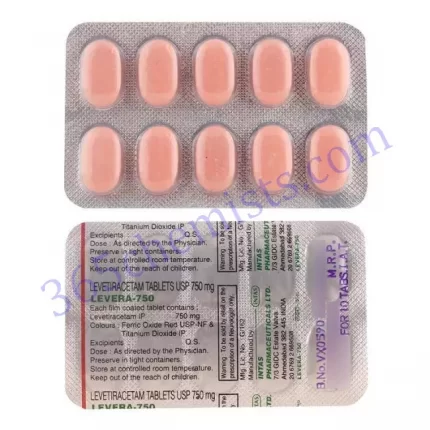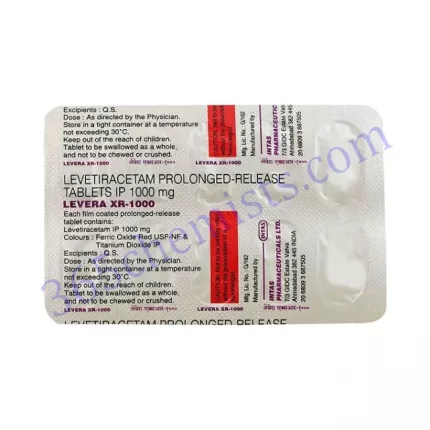Introduction
The medication known as Levera 1000mg Tablet contains levetiracetam, an antiepileptic drug that is included in the category of drugs known as antiepileptics. In the treatment of epilepsy and other seizure disorders, it is frequently recommended as a medication. The Levera 1000mg Tablet, as well as its uses, dosage, potential adverse effects, and safety considerations, are all covered in depth in this guide. Individuals can improve their overall treatment outcomes and their decision-making by improving their understanding of the medication they are taking.
Mechanism of Action
It is believed that the active ingredient in Levera 1000mg Tablet, levetiracetam, works by modulating neurotransmission in the brain. Its precise mechanism of action is not completely understood, but it is thought to bind to a synaptic vesicle protein known as SV2A. This protein is involved in its action. This interaction might have an effect on the release of neurotransmitters and help regulate the excitability of neurons. Levera helps prevent the abnormal electrical discharges that can result in seizures because of its ability to stabilise neuronal activity.
Uses and Dosage
The Levera 1000mg Tablet is most commonly recommended for use as an adjunctive therapy in the management of partial-onset seizures in epileptic adults and children older than 6 years old. It is important to use it under the supervision of a qualified medical professional, who will figure out the correct dosage for you based on individual factors such as your age, weight, and how well you respond to treatment. In order to achieve the highest level of seizure control possible, the dosage is typically started at a lower level and gradually increased over time.
Adverse Reactions and Safety Considerations
Even though the Levera 1000mg Tablet is generally well tolerated, it is essential to be aware of the potential adverse reactions and safety concerns associated with its use. Some of the most common adverse effects include drowsiness, dizziness, headache, fatigue, and changes in mood. Although these adverse effects are typically mild and temporary, you should contact a medical professional if they continue or become worse.
In extremely rare instances, Levera has been known to cause severe allergic reactions. These reactions can be identified by symptoms such as a rash, itching, swelling, severe dizziness, and difficulty breathing. At the first sign of an allergic reaction, seek emergency medical attention right away. Additionally, individuals who are taking Levera should be monitored for psychiatric symptoms, such as changes in mood, anxiety, agitation, and thoughts of suicide.
Related Product
Levera 250 Tablet
Levera 500 Tablet
Levera 750 Tablet
Levera 1000 Tablet
Levera DT 250 Tablet
Levera DT 500 Tablet
Levera Injection
Levera XR 1000 Tablet
Levera XR 500 Tablet
Levera XR 750 Tablet
Special Populations
When used by certain populations, the Levera 1000mg Tablet is subject to the following special considerations:
- Pregnancy and breastfeeding: It is important to conduct a careful risk assessment before using Levera during pregnancy or while breastfeeding due to the potential for it to cause harm to the developing foetus or infant. The qualified medical practitioner will weigh the benefits of the treatment against the potential risks and provide appropriate direction.
- Patients in the paediatric population: The use of Levera in children aged 6 and older is authorised. The dosage may change depending on the patient’s age and total body weight. Constant and careful observation is required to guarantee both safety and effectiveness.
- Patients of advanced age: Patients of advanced age may require dosage adjustments due to the possibility that age-related changes may occur in renal function. It is essential to monitor renal function on a regular basis in order to prevent drug accumulation.
Drug Interactions
It is imperative to inform a healthcare professional about any other medications, supplements, or herbal products that are currently being taken prior to beginning treatment with Levera 1000mg Tablet. There is a possibility that levetiracetam could interact with other medications, which could reduce its effectiveness or raise the likelihood that it will cause adverse effects. Among the medications that could potentially interact with Levera are the following:
- Antiepileptic medications: If you are taking multiple antiepileptic medications at the same time, your dosage may need to be adjusted so that you can keep your therapeutic levels and avoid adverse effects. The medical professional will conduct an in-depth analysis of the medication cocktail in order to guarantee the highest level of seizure control possible.
- Central nervous system depressants: Levera’s sedative effects may be amplified when combined with other drugs that have a sedative effect, such as benzodiazepines or opioids. It is important to exercise caution when taking both of these medications at the same time because doing so may increase the likelihood of experiencing drowsiness and a loss of coordination.
- Hormonal contraceptives: There is evidence from a few studies that levetiracetam may lessen the efficacy of hormonal contraceptives like birth control pills. When an individual is taking Levera, it is important to carefully consider all of their birth control options.
- Nonsteroidal anti-inflammatory drugs, also known as NSAIDs: Taking Levera at the same time as NSAIDs may increase the likelihood of developing kidney problems. It is essential to perform routine checks on renal function in patients who are taking both of these medications simultaneously.
In order to use Levera in a way that is both safe and effective, it is essential to have a conversation with your healthcare provider about any and all possible drug interactions.
Conclusion
The epilepsy and seizure disorders that can be managed with the help of Levera 1000mg Tablet are both treatable conditions. Individuals and healthcare professionals alike are able to make well-informed decisions regarding the use of a substance once they have a thorough understanding of its mode of action, uses, dosage, potential adverse effects, and safety concerns. When it comes to maximising the benefits of Levera therapy, regular communication with the healthcare professional, adherence to the prescribed dosage, and monitoring of side effects are all essential components. Levera has the potential to contribute to improved seizure control and a better quality of life for people living with epilepsy when it is administered and managed appropriately.












